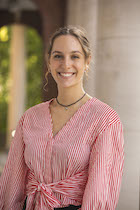Alumni
 |
Océane Parker
|
Océane grew up moving—from central Florida to deep Appalachia, urban centers in Argentina and France to small-town Texas. In retrospect, exposure to this range of environments from early childhood were pivotal in shaping her understanding how of systemic injustices and inequalities exist across a spectrum of environments. In high school, Océane’s growing interest in science began to align with service efforts. She began a project assessing root pathological causes of South Asian food insecurity, presenting at the 2016 Norman Borlaug World Food Prize international conference—laying the initial groundwork for meshing a passion for research with one for service.
Océane entered her first year at Vanderbilt fully intending to major in molecular and cell biology and explore a new range of service settings in Nashville—including Room in the Inn, Vanderbilt Garden Initiative, Project C.U.R.E., and the Nashville International Center for Empowerment. However, working with refugee families through Philadelphia’s Nationalities Services Center during a spring service trip became pivotal to narrowing an outrageously scattered service engagement towards human rights and women’s health. Starting her sophomore year, she became active with the Tennessee Immigrant and Refugee Rights Coalition, Project Bridges, and serving as co-president of Vanderbilt’s newly-reinstated Amnesty International. Following her first semester, plans to major in cell biology also evaporated in favor of pursuing neuroscience and global health. Throughout her second year, she became increasingly invested in the intersections of health and counseling access in marginalized communities, and neuroscience research. She spent the year preparing for a summer service project in Jodhpur, India with a women’s empowerment NGO. At Sambhali Trust, she created a set of comprehensive and culturally sensitive women’s health workshops for women in the shelters as well as worked with its foreign relations administration.
She now plans to continue pursuing the intersection of her long-term medical research goals with those of health rights advocacy. The fall of her junior year she began working as a Community Ambassador for Planned Parenthood Tennessee, as well as in a VU Medical Center neuroscience lab researching cognitive and behavioral effects of degenerative brain disorders. The following spring, she studied global and community health systems in Kisumu, Kenya, as well as in Uganda and Rwanda. Though cut short due to COVID-19 evacuations, she spent the remaining months conducting a research project evaluating the consequences of COVID-19 on women’s health and economic status in developing communities. This summer she is interning with Vanderbilt’s Institute for Global Health, and is excited to start her coursework this fall as she enters her senior year.
Océane is incredibly grateful to the generosity of the Ingram family not only for the privilege to pursue both academic and service aspirations, but for the opportunity to do so alongside the program’s incredible family of peers, scholars, mentors, and friends that have shaped her experience at Vanderbilt.
